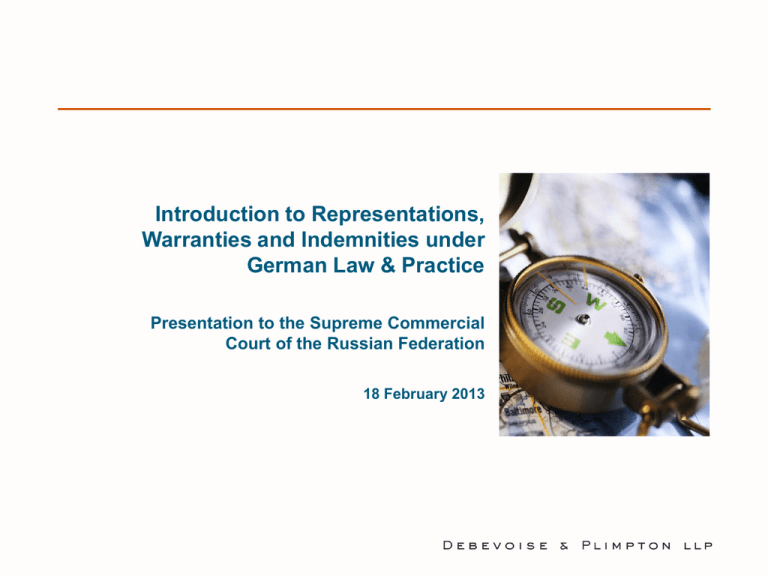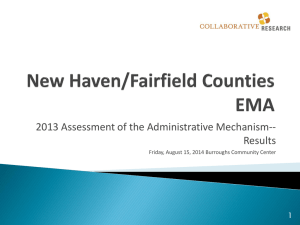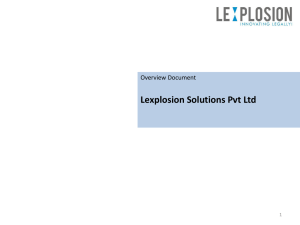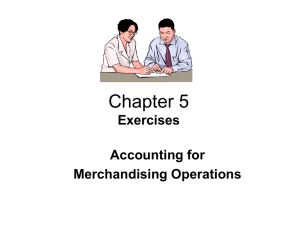II. Statutory Concepts: Warranty Law
advertisement

Introduction to Representations, Warranties and Indemnities under German Law & Practice Presentation to the Supreme Commercial Court of the Russian Federation 18 February 2013 Table of Contents I. Overview of Legal Concepts II. Statutory Concepts – Summary – Warranty Law – Culpa in Contrahendo – Avoidance – Frustration of Contract – Tort Law III. Contractual Concepts – Summary – Representations and Warranties – Specific Indemnities – Indemnity Clause 2 I. Overview of Legal Concepts Representations, Warranties and Indemnities Warranty Law (Gewährleistungsrecht) Culpa in Contrahendo (Verschulden bei Vertragsschluss) Tort (Deliktsrecht) Frustration of Contract (Wegfall der Geschäftsgrundlage) Avoidance (Arglistige Täuschung) = Statutory concepts = Contractual concepts 3 II. Statutory Concepts: Summary Concept Fault Remedies • • • • • Remediation (primary remedy) Rescission Reduction of purchase price Damages Reimbursement for wasted expenditures Warranty Law Not required (except for damages) Culpa in Contrahendo Intent or negligence • Damages Avoidance (Deceit) Intent • Cancellation with retroactive effect Frustration of Contract Not required • Adjustment • Rescission Tort (Fraud and Unethical Deliberate Infliction of Damage ) Intent • Damages 4 II. Statutory Concepts: Warranty Law (1) • Warranty law (Gewährleistungsrecht) applicable in case of sale of rights and goods • Amended in 2002 by reform of law of obligations (Schuldrechtsreform) • Defect in title (Rechtsmangel), Secs. 435 s. 1, 453 para. 1 alt. 1 of German Civil Code (BGB) – Defect = lack of transferability or other characteristics (e.g., voting or dividend rights), encumbrance with third-party rights ≠ value of acquired right (e.g., (over-)indebtedness of target, BGH NJW 80, 2408) • Defect in quality (Sachmangel), Sec. 434 para. 1 BGB – Defect = deviation from agreed or ”usual“ quality (Beschaffenheit) of sold goods 5 II. Statutory Concepts: Warranty Law (2) • Application of defect in quality rules to: – Sale of individual assets – Sale of enterprise as “other object” by way of asset deal, Sec. 453 para. 1 2. alt. 2 BGB (which codified case law, RGZ 63, 57; BGH NJW 1959, 1584) – Share deals by way of analogy if sale of enterprise, i.e., acquisition of “control“ on basis of articles of association and statutory minority rights – Case law (limited liability companies) (+) acquisition of 100% (RGZ 98, 289 (reversing RGZ 59, 240; 86, 146); BGH NJW 69, 184) (+) acquisition of 99.75% (BGH WM 70, 819) (+) acquisition of 75% (OLG Munich NZG 98, 593) (–) acquisition of 49% and 60% (BGHZ 65, 246; BGH NJW 80, 2408 (suggesting minimum threshold of at least 75% allowing acquirer to amend articles of association) • Transaction structure is typically driven by tax and/or business, but not by warranty law considerations 6 II. Statutory Concepts: Warranty Law (3) • “Enterprise“ (irrespective of share or asset deal) = entirety of rights and other assets ≠ individual rights or other assets (unless those have material impact on value or functioning of enterprise, BGH NJW 70, 556; 95, 1547) • Case law: defect in quality of enterprise (+) hotel: used as brothel (RGZ 67, 86) (+) scaffolding business: material shortage of scaffoldings (BGH NJW 79, 33) (+) key product useless and not marketable (BGH WM 78, 59) (+) lease of business premises not transferable to purchaser (BGH NJW 70, 556) (+) undisclosed material indebtedness (OLG Munich NZG 98, 593) (+) incorrect long-term turnover and profit figures capable of indicating earning capacity, but only if contractually agreed (BGH 77, 1538) protection of purchaser by way of culpa in contrahendo in case of shortterm turnover and profit figures or long-term turnover and profit figures which were not contractually agreed 7 II. Statutory Concepts: Warranty Law (4) • Remedies – Remediation (Nacherfüllung) as primary remedy – Rescission (Rücktritt) – Reduction of purchase price (Minderung), i.e., decrease reflecting lower value caused by defect – Damages (Schadensersatz) in case seller or person acting for him negligently or intentionally caused, knew or negligently failed to know defect, Secs. 249 et seq. BGB – Purchaser must be put in same position he were in without defect – Restitution in-kind (Naturalrestitution) as primary form of compensation – If not possible, monetary compensation – Reimbursement for wasted expenditures (Aufwendungsersatz), i.e., expenditures made by purchaser relying on defect-free contract performance 8 II. Statutory Concepts: Warranty Law (5) • Knowledge of purchaser – No protection in case of positive knowledge, Sec. 442 para. 1 s. 1 BGB – In case of gross negligent lack of knowledge no protection unless deceit or guarantee by seller, Sec. 442 para. 1 s. 2 BGB – No case law suggesting obligation of purchaser to perform to due diligence, but legal literature suggests that purchaser might be obliged to investigate further if due diligence indicates defects 9 II. Statutory Concepts: Culpa in Contrahendo (1) • Culpa in Contrahendo (Verschulden bei Vertragsschluss), Sec. 311 para. 2 BGB • Requirements – Pre-contractual relationship between seller and purchaser – Intentional or negligent violation of duty of good faith by seller – Fault of seller – Damage of purchaser – Causality between violation of duty and damage of purchaser • Conflicts – Warranty law blocks application of culpa in contrahendo if violation of duty of good faith by seller concerns quality of purchased object (BGH NJW 09, 2120) – Exception in case of intentional violation of duty of good faith by seller (BGH NJW 09, 2120) 10 II. Statutory Concepts: Culpa in Contrahendo (2) • Case law (+) non-disclosure of turnover if certain minimum turnover is from seller‘s perspective decisive for purchaser (BGH NJW 1970, 653) (+) misrepresentation relating to net profits (BGH NJW 77, 1538) (+) non-disclosure of 40% drop in turnover due to termination of maintenance contract within six-month period prior to signing (BGH NJW-RR 96, 429) (+) non-disclosure of material indebtedness of target (BGH NJW 80, 2408; 01, 2163) • Remedies – Damages, Secs. 249 et seq. BGB – Generally limited to reliance damage, i.e., purchaser must be put in same position as if contract had never been signed – Exception: purchaser must be put in same position as if contract had been fulfilled if contract had been signed at more favorable terms without violation of duty of good faith 11 II. Statutory Concepts: Avoidance (1) • Deceit (arglistige Täuschung), Sec. 123 BGB • Misconception as to material quality (Irrtum über wesentliche Eigenschaften), Sec. 119 para. 2 BGB, not applicable if defect in quality of purchased object can be subject matter of warranty law, BGH NJW 59, 1589) • Requirements – Deceit of purchaser through active misrepresentation or non-disclosure (in case of statutory or contractual duty to disclose) – By seller or third party – Causing or maintaining error of purchaser – Intent of seller (or, in case of deceiving third party, knowledge or negligent failure to know by seller) – Conditional intent sufficient, e.g., in case of statements at large (ins Blaue hinein) if deceiving person takes incorrectness of statements into account • Conflicts – Not blocked by warranty law – Often applied in connection with tort claims allowing damages despite cancellation of contract 12 II. Statutory Concepts: Avoidance (2) • Case law – Seller not obliged, without being asked, to disclose all information relevant for transaction – Seller obliged to disclose all information which he knows or should know is material for purchaser, e.g., because it could jeopardize purpose of contract (+) non-disclosure of material indebtedness of target which may cause its insolvency (BGH NZG 98, 506; 02, 644) (-) non-disclosure of fact that large part of turnover of doctor‘s office comes from only two or three patients which may leave in near future (BGH 89, 763) • Remedies – Cancellation of contract by avoidance declaration of the purchaser (contract is void and not only voidable) – Retroactive effect 13 II. Statutory Concepts: Frustration of Contract (1) • Frustration of contract (Wegfall der Geschäftsgrundlage), Sec. 313 BGB • Requirements – Fundamental change of circumstances which formed basis of transaction – Following signing – Not anticipated by seller and purchaser or not anticipated by purchaser, which seller noticed and did not correct – Seller or purchaser cannot be expected to be bound by contract in light of contractual and statutory risk allocation • Conflicts – Warranty law blocks application of frustration of contract in case of defect in quality of purchased object (BGH NJW 12, 373; NZM 08, 462) 14 II. Statutory Concepts: Frustration of Contract (2) • Case law (+) when entering into contract, seller knew that purchaser anticipated that seller would not compete with sold logistics company. Seller, however, did not correct such anticipation and started working for main competitor after signing (BGH NJW-RR 06, 1037) (–) drop in sales after closing (operational risk of enterprise generally borne by purchaser) (OLG Düsseldorf, NJW-RR 1993, 377) • Remedies – Adjustment of contract – If not possible, termination of contract 15 II. Statutory Concepts: Tort Law (1) • Fraud, Sec. 823 para. 2 BGB in connection with Sec. 263 of German Criminal Code (StGB) • Requirements – Intentional violation of legal provision aiming at protection of individual interests (Schutzgesetz) such as Sec. 263 StGB – Deceit of purchaser through misrepresentation or non-disclosure (in case of duty to disclose) – By seller or third party – Causing or maintaining error of purchaser – Resulting in disposition of purchaser over his assets – Damaging net asset position of purchaser – Intent of seller – Direct intent regarding enrichment of seller or third party (Bereicherungsabsicht) – Causality between violation and damage of purchaser 16 II. Statutory Concepts: Tort Law (2) • Unethical intentional infliction of damage (sittenwidrige vorsätzliche Schädigung), Sec. 826 BGB • Requirements – Infliction of damage by seller – Unethical – Intent of seller regarding infliction of damage – Conditional intent sufficient, e.g., in case of statements at large (ins Blaue hinein) if deceiving person takes incorrectness of statements into account 17 II. Statutory Concepts: Tort Law (3) • Case law (+) damage caused by deceit of seller qualifies as unethical intentional infliction of damage and may trigger tort law claim based on fraud (BGH NJW 60, 237) (+) non-disclosure of material tax liabilities (OLG Cologne NJW-RR 94, 1064) • Remedies – Damages, Secs. 249 et seq. BGB – Purchaser must be put in same position he were in without fraud or unethical intentional infliction of damage – Restitution in-kind (Naturalrestitution) as primary form of compensation – If not possible, monetary compensation 18 III. Contractual Concepts: Summary Concept Function Representation and Warranties Apportionment of risk for unknown potential issues Specific Indemnities Apportionment of risk for known potential issues (e.g., tax, environmental issues) Covenants Definition of obligations after signing Indemnity Clause Definition of remedies in case of breach of contract Developed by legal practitioners in 1980ies for larger scale transactions on basis of Anglo-American concepts 19 III. Contractual Concepts: Representations and Warranties (1) • Contractual representations and warranties regarding certain facts (Gewährleistungen) • No specific statutory basis, except for freedom of contract, Sec. 311 para. 1 BGB • So-called “independent guarantees” (selbstständige Garantieversprechen) – “Independent“ = not related to agreed quality (Beschaffenheit) under warranty law – Can be given by seller or third party (e.g., in case of framework sale and purchase agreement between ultimate parent companies and other group companies as sellers) – Irrespective of fault – Irrespective of seller‘s and purchaser‘s knowledge, but agreement on limitation by way of disclosure possible – Sale and purchase agreements typically expressly exclude statutory liability concepts to extent legally permitted (i.e., seller cannot exclude liability for intentional misrepresentations) 20 III. Contractual Concepts: Representations and Warranties (2) • Typical scope – Status of seller – Material agreements – Status of target – IT – Shares of target (in case of share deal) – Employees/Pensions – Financial statements – Litigation – Real estate – Product Liability – Intellectual property – Insurance – Other assets – Tax – Permits 21 III. Contractual Concepts: Representations and Warranties (3) • Advantages – Custom-tailored liability regime addressing needs of parties and specifics of transaction – Transparent for trained eye (“What you see is what you get“ (WYSIWYG)) – Avoids uncertainties associated with statutory concepts and undesirable remedies such as rescission and reversal of transaction as part of damages • Disadvantages – Complex and expensive due to need for legal advice – Not suited for unsophisticated purchaser 22 III. Contractual Concepts: Specific Indemnities • Specific indemnities (Freistellungen) • No specific statutory basis, except for freedom of contract – Used where risk is knows and disclosed, but occurrence of event and exact financial consequences remain unclear (e.g., tax, environmental issues) – Such risks can typically not be addressed in purchase price adjustment after closing because of such uncertainties – Can be given by seller or third party – Irrespective of fault – Purchaser does not have to prove damage, but can simply ask seller to resolve issues 23 III. Contractual Concepts: Indemnity Clause (1) • Indemnity clause (Rechtsfolgenregelung) • Definition of remedies of seller and purchaser in case of breach • Typically agreement on – Limitation of damages in deviation from Secs. 249 et seq. BGB) – Restitution in-kind (Naturalrestitution) as primary form of compensation – If not possible or adequate, claim for monetary compensation – De minimis/baskets/cap – Exclusion of lost profits, consequential damages and unreasonable expenses – No “double dipping“ (i.e., no damages if taken into account in purchase price adjustment mechanism) – Definition of breach notice procedure – Definition of third-party claim procedure – Limitation period 24 Contacts Peter Wand International Counsel T: +49 69 2097 5271 E: pwand@debevoise.com Taubenstrasse 7-9 60313 Frankfurt am Main 25








